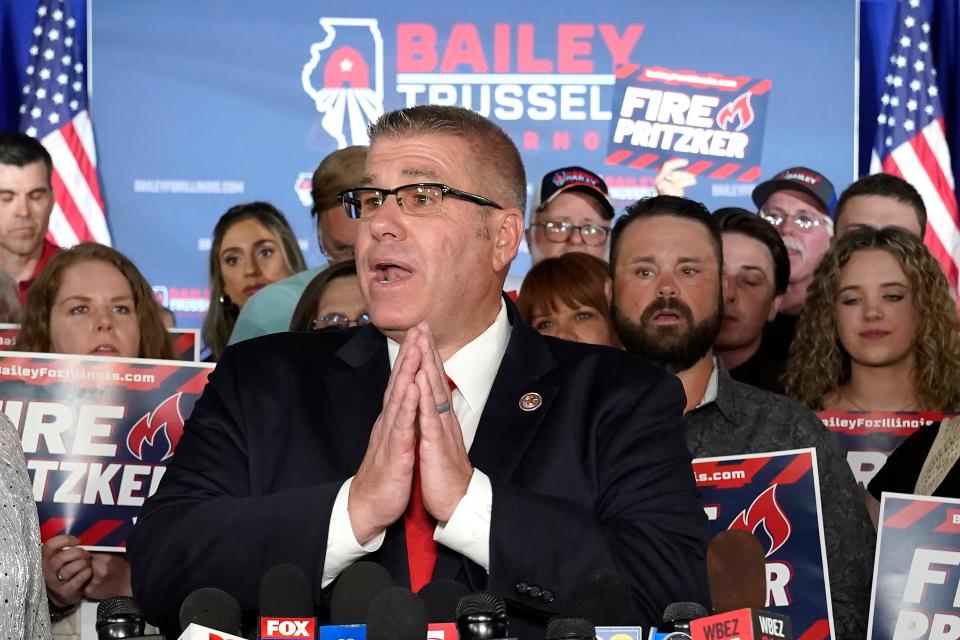In GOP races, Dems are buying ads to call out extremists. Is that 'aggressive' or 'dangerous'?

Michigan Republican Rep. Peter Meijer knew his primary race against challenger John Gibbs was going to be a nailbiter, but Democrats injecting themselves in it wasn't something he expected.
The 34-year-old freshman was one of 10 House Republicans who voted to impeach former President Donald Trump over the insurrection of Jan. 6, 2021, which infuriated many of his supporters in the GOP base.
Meijer lost to Gibbs, a former Trump administration official and a 2020 election denier, by 3 percentage points last week.
What disappointed Meijer, however, was that Democratic political operatives had used about $435,000 for an ad that drew attention to his opponent – labeling him as "too conservative " – in the final days of the contest.
"Now, this just highlights the cynicism and hypocrisy of our politics today," Meijer said on Sunday during an appearance on CBS' "Face the Nation."
"And frankly, it'll be unknowable what that ultimate impact was, but the fact that we have the establishment left and the extreme right locking arms in common cause paints a very telling picture of where our politics are in 2022."

More: Congressional race between Scholten, Gibbs, could remain competitive, analysts say
Critics in both parties say the Democratic Congressional Campaign Committee's spot brought out the Republican base, on a gamble that Gibbs will be easier to defeat in November.
Democratic operatives who are behind the strategy, however, argue it is not their fault that GOP voters are supporting candidates who spread lies about the last election.
Marshall Cohen, political director for the Democratic Governors Association, which has run similar attack ads, defended the 2022 game plan. He told USA TODAY the strategy is needed to get a jump-start on alerting general election voters on how extreme those contenders will be.
"Trump is the one endorsing and rewarding this extremism, and Republican primary voters are voting for it," Cohen said.
It's something that has divided Democrats, with some saying the party should want to win but not at the cost of being seen as helping Republicans who undermine the electoral process.
"The Democratic Party should never be showering gasoline on the arson that Donald Trump has started by helping election liars get more prominence and more visibility," said former Indiana Democratic Rep. Tim Roemer.
Rep. Bennie Thompson, D-Miss. and the Jan. 6 committee chairman, said he hopes the Democratic political leadership in this midterm cycle are proven right, but that it would have been wiser to use resources differently.
"When you when you roll the dice, you always want to come up with a winner but every now and then you crap out," he said.
Former House Majority Leader Dick Gephardt, a Democrat from Missouri, told USA TODAY he fully understands the "rough and tumble" of midterms and continues to support groups such as the DCCC, but that he's troubled by the recent maneuvers.
"It's just this one effort that I think is dangerous to the whole underpinnings of our system of governance," he said. "We have to be careful that we're not enhancing the ability of people that have really given up on elections in the country to be able to gain political office."
Gephardt said he plans to speak about the strategy with DCCC Chairman Sean Patrick Maloney, a New York congressman whom he described as a friend.
"I do not want in any way this to mean that I think Sean's not doing a fabulous job," Gephardt said. "It's a hard job. He made a call and his people made a call I don't agree, and that's fine. But I will talk to him about it.'
What did Democrats do in Michigan?
Gibbs is one of the many Republicans running in this year who has publicly denied the outcome of the 2020 presidential election.
"I think when you look at the results of the 2020 election, there are anomalies in there, to put it very lightly, that are simply mathematically impossible," Gibbs said during a televised debate in June. (No significant amount of voter fraud was found to have impacted the outcome of the last election, which multiple court jurisdictions and watchdog groups investigated.)
Yet the DCCC bought a TV ad that attacked Gibbs – and critics say that drew out the GOP base. The 30-second spot described Gibbs as being "handpicked" by Trump and "too conservative for western Michigan" on a host of issues, which some attribute to helping defeat Meijer by roughly 4 percentage points on Aug. 2.
Before the election, Meijer said if Democrats are betting on Gibbs being easier to beat in the fall, they may have made a dire mistake.
"Conventional wisdom dictates that these extreme candidates are less electable than the normal Republicans (that) Democrats targeted to defeat," Meijer said in an Aug. 1 open letter. "But with a historically unpopular president in Joe Biden and inflation at 40-year highs, less-electable doesn’t mean un-electable."
Politics: Trump had to know he was spreading 'Big Lie,' Jan. 6 committee member says
Will Democratic strategy backfire?
For months, national Democrats have warned voters that Trump and his allies have infected the GOP with lies about the last election, spawning a slate of candidates who threaten U.S. democracy.
During the 2022 primaries, however, groups such as the DCCC and the Democratic Governors Association have spent tens of millions intervening in GOP primaries across the country in ways that critics say have boosted far-right candidates who joined Trump in spreading election misinformation.
As a result, those critics say, election deniers have won primaries in Maryland, Michigan, Illinois and Pennsylvania for Congress and governor.
"We're simply starting to expose this danger before the primary will continue to hold them accountable in the general election," Cohen said.
Those against the strategy – including many Democrats – warn it could backfire in the fall if any of those election deniers ultimately prevail.
“I know folks who are the opinion leaders within the Democratic Party, and there's some uneasiness with his strategy,” said Jason Altmire, a former congressman from Pennsylvania.
“Some of the people that they are supporting in primaries do have a legitimate chance to win in the general election,” he added. “So it is something that they might come to regret.”
Roemer, the former Indiana representative who also served as U.S. ambassador to India, said it is "offensive" for the DCCC to employ such a "Machiavellian tactic" when many Americans are rightfully concerned about the health of the country's democracy.
"When you elevate an existential threat to our country, such as lies about our democracy and fair elections, you are spreading a cancer that we may not be able to cure," he said. "And that is just not worth, you know, the price."
Altmire and Roemer are among three dozen ex-Democratic lawmakers who rebuked the game plan in an Aug. 1 letter drafted by Issue One, a non-partisan group which seeks to reduce the role of money in politics.
Democrats notch wins: Is Biden making a comeback? Jobs report and abortion fight give Dems new life
Ads reflect an aggressive approach
But those overseeing the strategy in this year's midterms defend the idea, saying naysayers are misreading their intentions and responsibility of who wins a GOP primary.
Cohen, the DGA political director, said the Democratic group cannot be held responsible for election deniers winning over other GOP contenders. That falls on Trump, who "has an iron grip over" what has been rewarded by "MAGA extremism" in its base.
Democrats have made a choice in the midterms, he said, to take a more aggressive approach to "protect democracy" and other rights.
"I really do feel like the crisis we face is not one individual Republican candidate, but with an entire Republican Party that has fully embraced Trump's lies about the 2020 election," Cohen said. "And there's not a single, moderate Republican running in these primaries, who has the courage to stand up to Trump and MAGA base."
What are Democrats doing?
Democratic political committees and campaigns have spent millions in Republican elections this cycle.
In Illinois, for instance, the DGA ran an ad that slammed Trump-backed state Sen. Darren Bailey, for "calling into question our elections" during his primary battle against Aurora Mayor Richard Irvin.

Almost a year after the 2020 presidential election, Bailey refused to say if Biden had won fairly, telling reporters he "did not know" when asked if the race had been stolen, according to The Pantagraph, a local paper in central Illinois.
The DGA and Democratic Gov. J.B. Pritzker spent roughly $35 million on ads targeting the Republican election in June, according to the the nonprofit group OpenSecrets.org, which tracks campaign finance data.
Bailey coasted to win the GOP primary with 57% of the vote.
In July, the group doled out more than $1 million attacking Republican Dan Cox as the former president’s “handpicked candidate.”
Cox, a former state legislator, organized buses for those who flocked to the Capitol on Jan. 6 and in a tweet that day, he called former Vice President Mike Pence a “traitor" just before the riot began.
When he announced his run for governor in a four-minute video, he called for a “forensic audit" of Maryland's results in 2020 despite Trump losing by more than 30 percentage points in the state.
Primary recap: Kansas upholds abortion rights, Trump-backed candidates win in Arizona
Trump critics: Tuesday's primaries, election conspiracies and Donald Trump's long trail of broken brains
Cox won the Maryland primary by roughly 9 percentage points over Kelly Schulz, a state legislator who was backed by Gov. Larry Hogan.
Cohen, the DGA political director, said what critics of the strategy fail to note is how much Trump has altered the GOP, and that the Democrats' efforts had little influence over the choices Republican primary voters were going to make.
Those candidates were going to win in those respective races for governor, anyway, he said.
"The reckoning Republicans need to have is with their own party, and with Donald Trump, who has rewarded the most extreme candidates," Cohen said.
We are making one rating change in #MI03 where Meijer (R) lost his primary. The race moves from Toss Up to Lean D.
Full rating chart: https://t.co/TZpFmVY7sH pic.twitter.com/E7RlQaNcMa— Cook Political Report (@CookPolitical) August 3, 2022
The DCCC declined an interview request with its chief political strategist about targeting Gibbs in the Michigan congressional primary, but the political benefits have already begun to bloom in Democrats' favor.
In the aftermath of Meijer's loss on Tuesday, DCCC officials pointed out that the Cook Political Report changed its rating for seat from a toss-up to leaning Democratic race this fall.
"Republicans have no choice but to embrace their unelectable MAGA extremist candidate," DCCC spokesman Matt Corridoni told USA TODAY.
Smart move or cynical play?
Despite the arguments in favor of going after GOP election deniers as a way to get the attention of general election voters, thus making them easier to beat, some Democratic incumbents are worried about a larger message.
"Sometimes we can be a little too cute in our approach to politics," Rep. Bennie Thompson, D-Mississippi, who chairs the Jan. 6 investigative committee, told USA TODAY.
Thompson has been leading a series of nationally televised hearings on how Trump and his allies used disinformation to ignite the Capitol riot in an attempt to overturn the 2020 election.
Asked if the DCCC midterm strategy undermines the Jan. 6 committee's work, Thompson said the game plan "is not good," adding it makes no sense for Democrats to be associated with those type of tactics.
"The best thing you can do is promote the Democratic candidates, promote why voting for Democrats is important and leave the Republicans to themselves and our own devices," he said.
"I would hope they win, but again, I have seen success with people working hard and promoting democratic values rather than promoting (election) deniers."
Republicans who have spoken out about Trump's misleading comments about the last presidential race add how this move by Democrats won't help in building bipartisan trust on combating election conspiracy theories.
"I get everything's hard-nosed, I'm not naive, but when we're talking about our democracy in the state of our democracy and trying to preserve our democracy, I think these groups – it’s hypocritical," said Trey Grayson, a former Republican Kentucky secretary of state.
Grayson, who served on former President Barack Obama's bipartisan commission on election administration in 2012, said putting someone who believes the last election was stolen in a critical office, such as governor of a swing state, should deter any strategist.
"Even if it's done in politics where they think they can win these races more easily, that's incredibly dangerous and it's incredibly risky," he said.
What if this backfires?
What worries some Democrats is if a Republican who has denied the 2020 election results wins one of the critical contests this year.
During the Pennsylvania gubernatorial primary, for instance, Democratic nominee Josh Shapiro mimicked the strategy used by Democratic groups. He spent about $1 million to air an ad that called out Republican Doug Mastriano's view, including his effort to audit the 2020 election.
Polls have shown Shapiro's lead has grown to double-digits, but it hasn't quieted concern.
"It's an interesting strategy and one that could pay off in big ways, but it is also one that is high risk, especially given the hyper polarization that we're seeing today," said Boston NAACP President Tanisha Sullivan, who is running for Massachusetts secretary of state.
Election subversion: Trump Republicans push laws to make it easier to change elections, per report
Sullivan said those running for governor and secretary of state have an "important frontline role to play in fighting back against" those who are trying to undermine the electoral process.
"That being said, I do believe that the Democratic Party has to be more aggressive, and ensuring that it is doing all it can to secure wins in this midterm cycle," she said.
Mike Mikus, a veteran Democratic strategist in Pennsylvania, said he wouldn't use this strategy in a red state or area that leans GOP, but supports Democratic political committees taking the fight to Republicans, especially in a midterm election where every win will count.
"There is no guarantee that you will win, but what you have to do is play the odds and the odds say that these candidates are easier to defeat," he said.
"I understand sometimes the politics there is a give and take between the best strategy and standing true to your values, but quite frankly, this is about winning the election, because we've seen moderate Republicans get steamrolled over and over and over by the Trump wing of the party."

The last few election cycles have been unpredictable, Altmire, the former Pennsylvania congressman, told USA TODAY. He said the nightmare scenario of an election denier winning a significant seat overseeing the 2024 presidential election far outweighs any immediate electoral reward.
"You know what, they might be right, and in some cases that person might be easier to beat," Altmire said. "But if you bet wrong, you end up with a much worse outcome than you otherwise would have."
This article originally appeared on USA TODAY: Dems explain why they've bought ads in GOP races to attack extremists

